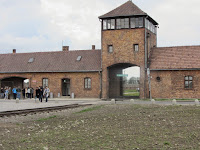We left Friday morning to go to Krakow and got our first glimpse of the city at the salt mines. The Wieliczka Salt Mine was first built in the 13th century, and has been in operation almost continiously since it was built. Currently though, tours are the only thing that happens in the mine. It was so interesting to not only see the mines, but learn about how the salt was mined, the dangers of mining, and other random facts about salt. One thing I found very interesting is that the salt actually does not look clear until it is ground up, and it does not go through a refining or cleaning process either. Of course I had to lick the wall and taste it, as so many tourist do, and it was definitely salty! We also saw a few of the chapels they have in the mine, one of which is more of a cathedral where services are held every Sunday and is even used for weddings. After the mine, we went to the hostel, checked in, and then were free for the day. I went to the town center to find supper with a few people, and we found some amazing fish and chips. Then we returned to the hostel after a little bit more walking around and played some card games in the kitchen until pretty late at night.
On Saturday, we went to the Wawel Royal Castle. It was built in the 14th century, but has been remodeled and altered many times in its history. While there, we visited the armory, treasury, state rooms, and royal private apartments. It was a very large beautiful castle, and I really enjoyed visiting it. After the castle, we went to the Old Town Square and talked a little bit about it before dispersing for lunch. I went with a few people to a burger place called Moaburger, and it was amazing. We had burgers the size of our heads, and they were very filling and very delicious. Then some of us met again in the square at 2 and went to Schindler's Factory. It was the factory where Oscar Schindler employed many Jews and saved them from going to concentration camps, and it has now been turned into a museum. It was interesting to not only learn more about Oscar Schindler but to also learn more about WWII from the Polish perspective, since we have mainly been learning about it from the Czech side. After the museum, we were still not that hungry, so we wandered back into town and went for some cupcakes and ice cream. Other students who had studied abroad on this trip before said the cupcakes at Cupcake Corner Bakery were the best, so we had to go try them. And believe me, they were absolutely fantastic! Once we finished with the cupcakes, we did some souvenir shopping and then headed back to the hostel for about an hour. Then about half of us went to this pub and ate some pizza and tried some flavored beer, because apparently that is a thing that it popular in Krakow. After that, we returned to the hostel and played some more cards until pretty late.
We just made it back to Olomouc a little after 6 our time. It was a very interesting weekend, to say the least. Although I love learning more about history, it was so difficult to visit the camps and hear about the terrible things that went on there. However, it makes me think of the quote by George Santayana that says, "Those who cannot remember the past are condemned to repeat it." What that means to me is just because the Holocaust was one of the worst human tragedies in history, it does not mean we should forget about it. Instead, we should learn as much about it as possible so we can insure that nothing like it happens again.




















No comments:
Post a Comment